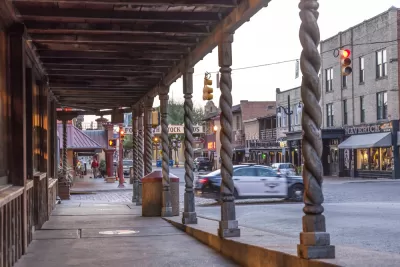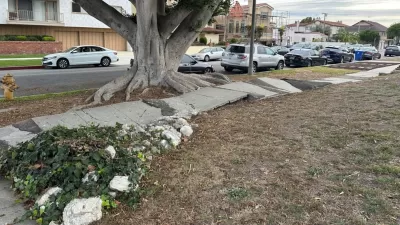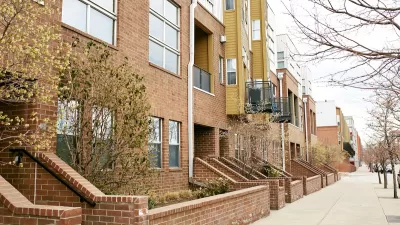A proposal in the city council could shift the burden of sidewalk repairs away from property owners, who are currently responsible for 100 percent of expenses.

After noticing the disparate states of sidewalks in different parts of her own neighborhood, Fort Worth journalist Emily Wolf examines the city’s sidewalk paving policy to find out why some sidewalks in the city are more well-maintained than others.
As it turns out, “Fort Worth has required private homeowners to maintain sidewalks since the 1960s, but stopped enforcing the penalties included in that ordinance several decades ago. What’s resulted is a patchwork of sidewalks in various states of disrepair across the city, with little recourse for owners with lower incomes or disabilities.” The issue is particularly evident in front of rental properties, Wolf notes. “Sidewalks in front of rentals, in particular, were often littered with large fractures and divots, the rentals’ owners far away from the realities of the area.”
Whether coincidentally or not, months after Wolf published a piece about the city’s inconsistent sidewalk policy and the challenges it poses for residents with disabilities, among others, “city staff presented a proposal to city council to establish a cost-sharing program similar to Dallas. Under the proposal, the city would use a portion of the fiscal year 2023 PayGo funding, totaling $2.6 million, to develop the program.” The program would have the city pay for 50 percent of the cost of repairs, “with a particular emphasis on low-income homes, seniors and disabled residents.”
FULL STORY: Walking the walk: government reporter explores the reasons for Fort Worth’s crumbling sidewalks

Alabama: Trump Terminates Settlements for Black Communities Harmed By Raw Sewage
Trump deemed the landmark civil rights agreement “illegal DEI and environmental justice policy.”

Planetizen Federal Action Tracker
A weekly monitor of how Trump’s orders and actions are impacting planners and planning in America.

Why Should We Subsidize Public Transportation?
Many public transit agencies face financial stress due to rising costs, declining fare revenue, and declining subsidies. Transit advocates must provide a strong business case for increasing public transit funding.

Understanding Road Diets
An explainer from Momentum highlights the advantages of reducing vehicle lanes in favor of more bike, transit, and pedestrian infrastructure.

New California Law Regulates Warehouse Pollution
A new law tightens building and emissions regulations for large distribution warehouses to mitigate air pollution and traffic in surrounding communities.

Phoenix Announces Opening Date for Light Rail Extension
The South Central extension will connect South Phoenix to downtown and other major hubs starting on June 7.
Urban Design for Planners 1: Software Tools
This six-course series explores essential urban design concepts using open source software and equips planners with the tools they need to participate fully in the urban design process.
Planning for Universal Design
Learn the tools for implementing Universal Design in planning regulations.
Caltrans
Smith Gee Studio
Institute for Housing and Urban Development Studies (IHS)
City of Grandview
Harvard GSD Executive Education
Toledo-Lucas County Plan Commissions
Salt Lake City
NYU Wagner Graduate School of Public Service





























